Leveraging Technology for Efficient WGEA Reporting
Leveraging technology for efficient WGEA reporting is indispensable in today's digital age. It not only simplifies the reporting...
Unlock effortless compliance: Your partner in meeting the WGEA Reporting Requirements.

Regardless of what measure of pay you use, there is always a gender pay gap in favour of men in Australia.

Comprehensive solutions that guarantee compliance with your mandatory Workplace Gender Equality Agency (WGEA) reporting. Save valuable time and resources while benefiting from our deep understanding of the new reporting requirements.
Our business is built on deep expertise in mandatory WGEA reporting processes. We offer solutions with unique services and deliverables tailored to unlock opportunity, reduce risk, and maintain compliance.
Historic hiring practices, talent pipeline issues, industry bias, prior culture, lack of diverse candidates for senior roles, and more, all contribute to your workforce make up. Then lack of policies, expertise, and processes see stalled initiatives. Add to that revenue, profit and growth priorities, and you have a recipe for spiralling retention and attraction issues.
Salary & Payroll Reviews, Pay Gap Policies, Employee Consultation, Gender Equality Strategies, Hiring & Promotion Practices, Flexible Working Considerations, Domestic Violence Support, Parental Leave, Staff Surveys, Focus Groups, Harrassment & Discrimination Policies & Strategies, WGEA Reporting Optimisation.
We'll efficiently and effectively take care of your mandatory WGEA Reporting. We'll create your Employer Gender Pay Gap Statement. We'll develop professional Board Packs. We'll craft your new policies & strategies. We'll conduct surveys & consultations. We'll even help you prepare and apply for the WGEA Employer of Choice citation.
CEOs, Heads of People/HR, and DE&I Leads all agree: The new WGEA requirements represent both risk and opportunity. Top of mind for leaders as we approach the reporting deadline are Data, Deadlines, Reputation, Change Management, Increased Accountability, Financial Implications, and Long-term Strategic Impact.

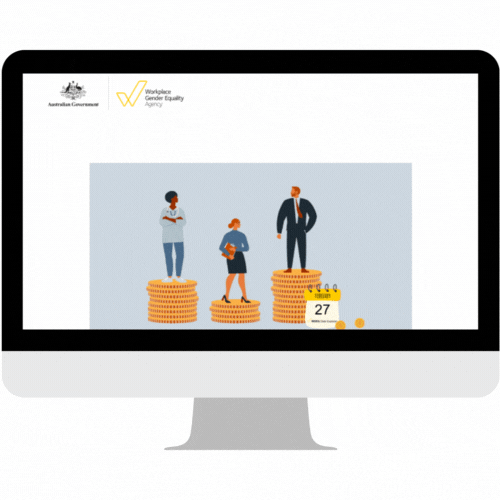

"Which big employers have the largest and smallest gender pay gaps? New data reveals all"

"Worst gender pay gap companies revealed"

"Big businesses with very big gender pay gaps"

"The gender pay gap in some of Australia’s biggest companies revealed"
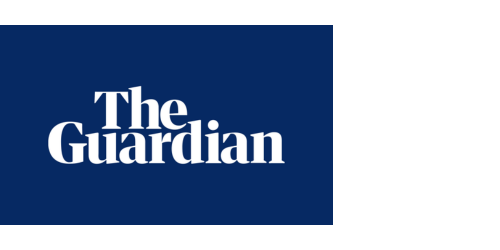
"Dozens of Australian businesses have gender pay gaps above 50%, landmark data reveals"

"Gender pay gaps to be exposed at Australian companies"

"Think your male colleagues earn more than you? Soon you'll know for sure"
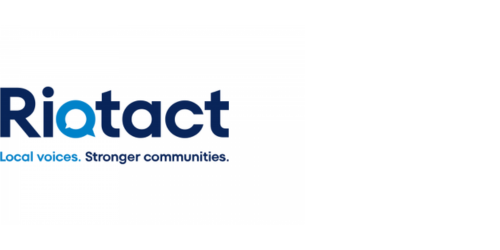
"Businesses on notice as government prioritises closing the gender pay gap"

"Gender pay gaps to be exposed at Australian companies"

"Gender pay gaps at Australian companies to be published online"

"More than 5000 employers preparing to see their gender pay gap made public"

"More than 5000 Australian employers will soon have their gender pay gap made public"

"Gender pay gap data of large Australian businesses to be published"
Your mandatory WGEA Reporting submissions are due by 31 May 2024.
May not be eligible to tender for Government contracts or qualify for Government grants which reduces the ability to generate income and damages reputation. Don’t get on this list.
Holding the WGEA Employer of Choice for Gender Equality (EOCGE) citation improves retention and attraction, as well as generating positive public relations. These citations improve business performance.
The Workplace Gender Equality Agency publicly published the gender pay gaps for every Australian employer with 100 or more employees on 27 February 2024.
This included your 1 April 2022 – 31 March 2023 data.
You had until 20 February 2024 to provide a statement, and ensure it is included alongside the public publishing of your gender pay gap. Get yours today!
Stay up-to-date with the latest WGEA changes, prepare for your mandatory reporting, read our guides, and download the checklists.
Leveraging technology for efficient WGEA reporting is indispensable in today's digital age. It not only simplifies the reporting...
In an era where gender equality and workplace diversity are not just ethical imperatives but also strategic advantages,...
In the dynamic landscape of Australian workplace regulations, the Workplace Gender Equality Agency (WGEA) plays a pivotal role...
We will NEVER misuse your information.
Initially, it wasn't too bad. Register, complete a questionaire, submit.
However, these days the process, obligations, implications and risk have grown.
More data needs to be collected, additional visibility across the organisation is required, and having or not having certain policies and processes in place can be published.
Most in-house HR Managers or DE&I Leads we speak to say it can take up to 6 months to complete all collection, surveying, profiling and WGEA reporting templates.
This is dangerous as the WGEA only give you 2 months to submit your reporting after the period ends in March each year.
When..?
The WGEA will publish the gender pay gap for private sector employers with a workforce of 100 or more employees on the 27th of February, 2024. This will cover the 1 April 2022 - 31 March 2023 reporting period.
Why..?
In 2023, the "Workplace Gender Equality Amendment (Closing the Gender Pay Gap) Act 2023" was passed into Australian legislation. Included in this Act were reforms designed to encourage employers to deploy and drive workplace policies, practices and environments that support gender equality. Drawing from international experience, there is information which has shown publishing employer gender pay gaps can lead companies to prioritise gender equality and to a lowering of employer gender pay gaps. The WGEA specifically refers to the UK, where research indicates it motivated some employers to narrow the wage gap between men and women.
Note: Commonwealth public sector organisation’s gender pay gaps will be published in late 2024 or early 2025. Data for Commonwealth public sector organisations will be based on their 1 January 2023 – 31 December 2023 reporting data as their reporting periods differ from the private sector.
Well, if you have to ask…
The official rules state: The Workplace Gender Equality Act 2012 requires non-public sector employers with 100 or more employees to submit a report to the Workplace Gender Equality Agency.
Plus, even if you have less than 100 employees, there may be circumstances that require your to at least register with the WGEA – eg. tendering for Government Contracts or being eligable for Government Grants.
Yes.
If you are required to report under the Compliance Reporting Program and can not demonstrate compliance, you may be named on the Non-Compliant Organisation list and may not be eligible to tender for Government contracts.
Also, you may not be eligible for some grants or other Government financial help.
Yes.
31st of May each year is the deadline.
Your report covers the 1st of April to the 31st of March each year, so you have 2X months to complete the process.
If you do not submit before the 31st of May, you may be made non-compliant. (see the answer above)
Yes.
We complete strict non-disclosure agreements before commencing any engagement.
Any and all information we collect, receive, collate, produce for/from you is held safely and securely within robust systems, hosted within Australia.

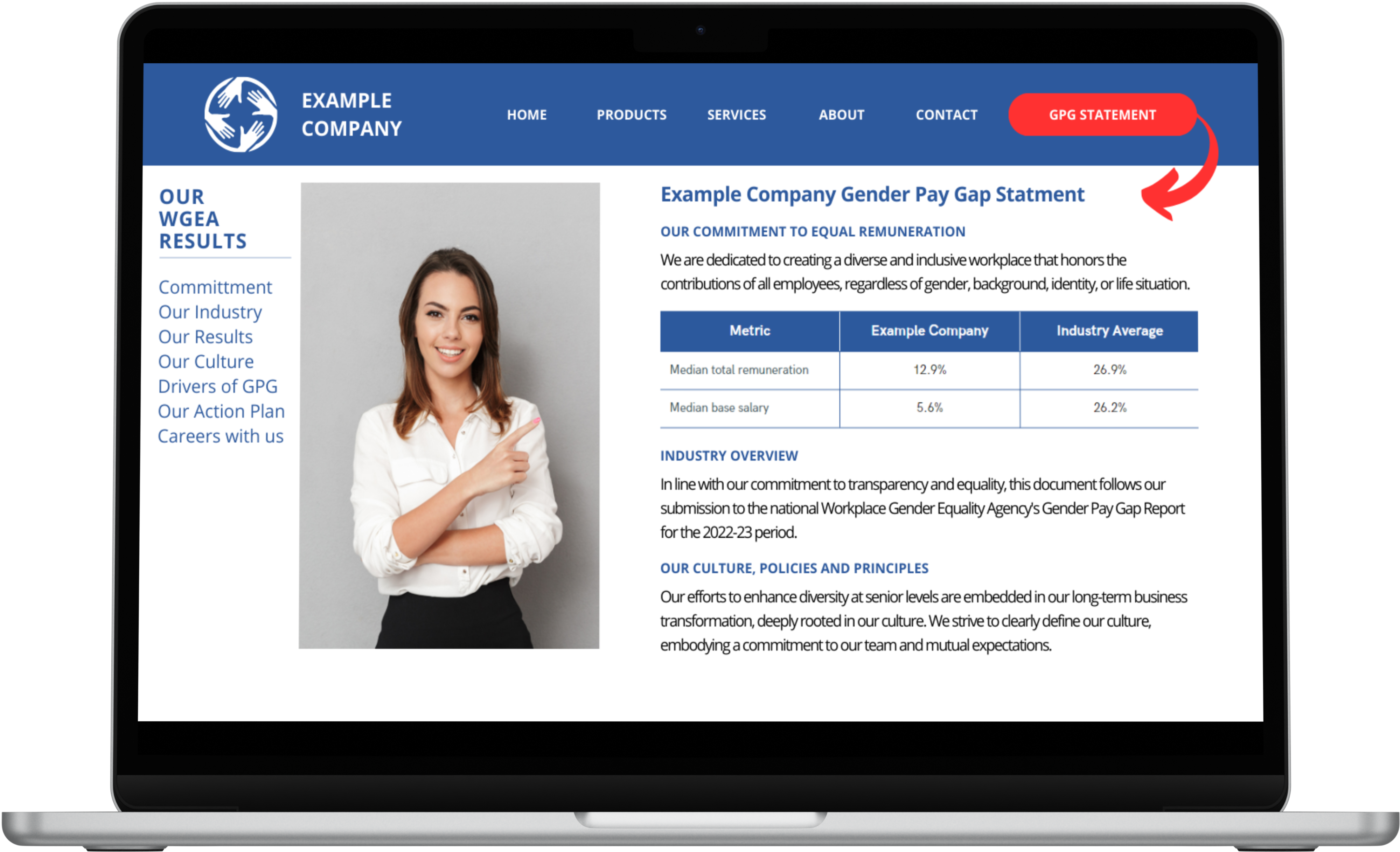
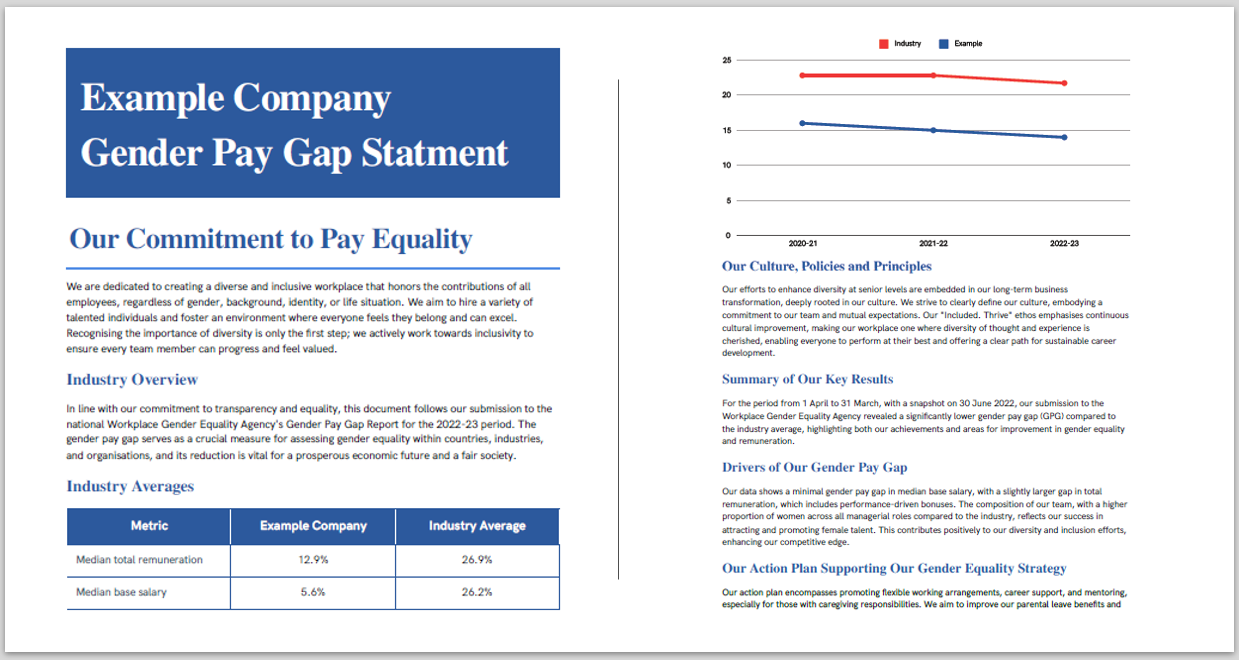
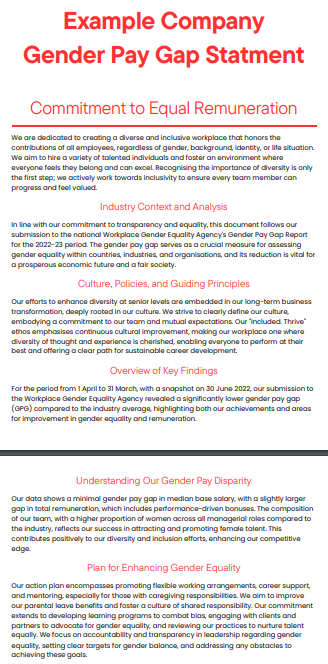
March 2024
"Jobseekers asking more questions about gender pay gap after WGEA data"